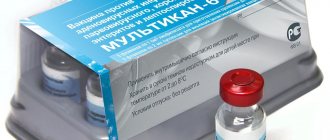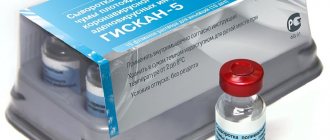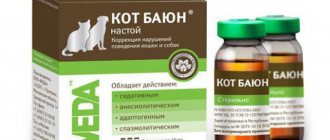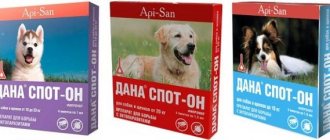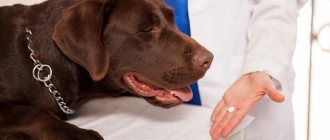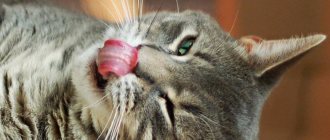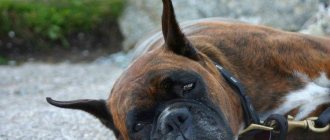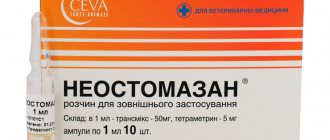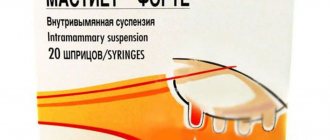| Description of the drug | |
| Release form and storage conditions: | 1 ml of dry component and 2-10 ml of liquid substance (in separate bottles); should be stored in a place away from sunlight at a temperature of 2-8°C (shelf life - 18 months from the date of issue) |
| Price: |
|
| Analogues: | Primodog, Hexadog, Biocan, Vanguard, Nobivak, Eurikan |
The Multkan 8 vaccine consists of 2 components:
- lyophilisate containing strains of canine distemper virus, canine adenovirus type 2, parvovirus and canine coronavirus
- a solvent containing strains of Leptospira serogroups Canicola and Icterohemorrhagia and rabies antigen
Lyophilisate Multikana-8 is a dry, homogeneous, finely porous mass of yellow-pink color.
The solvent is a homogeneous pink suspension with sediment at the bottom of the bottle (adjuvant), which, when shaken, easily breaks into a homogeneous suspension. The lyophilized and liquid components of the vaccine are produced in volumes of 1 and 2 ml, respectively, in bottles or ampoules with a capacity of 3-10 ml.
The Multikana-8 bottle contains one dose of each vaccine component. Other packaging of Multkan is allowed, agreed upon in accordance with the established procedure. The box with the drug contains instructions for use. The liquid component is a lyophilized solvent.
How is the vaccination done?
When vaccinating dogs with Multikan 8, the following sequence of actions should be followed:
- The liquid component must be heated to a temperature of 36-38˚C. This will help the dry component dissolve better.
- Shake the liquid in the bottle well until the sediment disappears.
- Then you need to draw the liquid component into a syringe and use it to dilute the dry component.
- Shake the ingredients well. Sediment at the bottom is not allowed. If it is not possible to shake up the precipitate, the solution is driven several times through a syringe.
- The prepared solution is injected into the femoral muscle, after wiping the area with medical alcohol.
Before vaccination, puppies and dogs must be dewormed. This is done a week before vaccination so that the parasites have time to die and leave the body. The use of antiparasitic agents is necessary, since the presence of worms significantly reduces the effectiveness of Multikan 8. The fact is that the waste products of parasites are toxins. The body directs all its energy to removing these toxins from the body, rather than creating immunity against the introduced viruses.
INDICATIONS FOR USE
According to the instructions, Multikan-8 is intended for immunizing dogs against:
- plague
- adenoviral infections
- parvovirus enteritis
- coronavirus enteritis
- leptospirosis
- rabies
Plague virus.
Modified live virus (MLV) vaccines are most effective in protecting dogs against distemper. Inactivated whole virus vaccines are not effective. Vaccination with Multican-8 in puppies usually continues until 16 weeks of age. Dogs over 12 weeks old when presented for initial vaccinations should receive at least 2 vaccinations 2 to 3 weeks apart.
Infectious hepatitis.
Vaccination against adenovirus infection in dogs, the cause of canine hepatitis (ICH) infection, is usually given in combination with that for distemper and other diseases, starting at 6-8 weeks. Attenuated (MLV) adenovirus vaccines are commonly used due to their ability to induce a superior immune response. Therefore, vaccination against adenovirus is usually combined with canine distemper virus; Multikan-8 is excellent for this purpose.
Infectious tracheobronchitis in dogs.
Infectious tracheobronchitis, or kennel cough, is a complex clinical infection caused by a number of respiratory pathogens that can infect dogs individually or in combination. The Multikan-8 vaccine is intended for immunization of dogs against adenovirus type 2.
Canine parvovirus
- the most dangerous viral disease for puppies. Canine parvovirus 2 (CPV-2) vaccines are available as inactivated or attenuated products. Multikan-8 is an effective solution for the prevention of parvovirus in dogs.
Canine coronavirus.
Most vaccines licensed for canine coronavirus are inactivated canine coronavirus strains. Multikan 8 has a strain against canine coronavirus.
Leptospirosis. The Multikan-8 vaccine includes an inactivated anti-leptospirosis component. However, the lack of global and regional data on the incidence of leptospirosis in dogs makes it much more difficult to decide whether vaccination is necessary and which vaccines should be used.
How it works
When vaccinating with Multican 8, pathogens of various viral diseases are introduced into the dog's body by injection. They are weakened enough that they cannot harm a healthy animal. At the same time, the body develops a stable immunity to them. The vaccine begins to act, that is, resistance to viruses appears in the body, 2-3 weeks after vaccination. The effect lasts for 12 months. Then repeated administration of the drug is required.
The vaccine is harmless if you follow all the rules and recommendations for animal vaccination. It cannot be used for medicinal purposes; it is only suitable for preventing the development of viral diseases.
DOSE OF MULTICAN-8 AND METHOD OF ITS APPLICATION
- Before use, the lyophilized vaccine Multikan 8 is dissolved in a bottle
with a liquid component and shaken until a homogeneous suspension is obtained. - The vaccine is administered intramuscularly in the thigh area in a dose of 2 ml immediately after dissolution. Dogs of small and decorative breeds are vaccinated at a dose of 1 ml.
- Adult dogs are vaccinated once a year.
- A separate needle is used for each animal.
- Syringes and needles are sterilized by boiling for 10 minutes before use.
- The vaccine is administered to puppies at 8-10 weeks of age and again after 21-28 days. Revaccination of puppies is carried out at the age of 10-12 months.
What is it used for?
According to the instructions, the Multikan 8 vaccine for dogs is used to prevent the following pathologies:
- carnivore plague;
- respiratory tract diseases caused by adenovirus;
- enteritis caused by parvovirus;
- coronavirus enteritis;
- rabies;
- leptospirosis.
The product is used for both puppies and adult pets. The main feature is that it reduces the risk of developing diseases that are fatal to pets. In addition, if infected, pets tolerate the disease more easily, have a greater chance of recovery and recover faster if treatment is started on time.
Types of Vaccines
The technologies used to produce canine vaccines have expanded significantly over the past decade. In veterinary medicine today, the number of licensed vaccines continues to grow, driven in large part by the need to protect dogs and cats from emerging pathogens, improve vaccine safety, and improve the immunogenicity of existing vaccines. However, the recent introduction of Therapeutic Biology into veterinary medicine highlights the role of new types of vaccines licensed for the treatment rather than the prevention of disease (especially cancer) in dogs and cats. Multikan-8 is a highly effective vaccine for dogs produced in Russia.
LIMITATIONS: Inactivated vaccines are generally less immunogenic and generally do not have an increased duration of immunity (immunological memory) compared to attenuated live vaccines using the same microorganism. Inactivated vaccines often contain an adjuvant designed to stimulate local inflammation and enhance the immune response to the antigen. Post-vaccination reactions associated with inactivated vaccines include injection site pain and granuloma formation, as well as angioedema.
Contraindications
The instructions indicate that Multikan 8 should not be used to immunize the following categories of dogs:
- for puppies up to 2 months of age;
- for pregnant bitches in the last month of gestation;
- for females in the first month after birth;
- for weakened animals;
- for pets whose chronic diseases have worsened;
- for sick dogs with infectious and other pathologies.
The vaccine should not be used within two weeks after using preparations that contain chlorine or phosphorus.
Important! Do not administer the product in the same syringe with biological products or other medications.
Learn about essential drugs in animals
- Do puppies need to be vaccinated?
- Vaccination against rabies in cats
- Vaccination of small animals
- Kitten vaccination
- Why vaccinate dogs against rabies?
- Why do kittens need to be vaccinated?
- What kind of drug is Nobivak Triquet Trio?
- Nobivac DHPPi for dogs
- What is the first vaccination for a puppy?
- Comprehensive vaccinations for cats
- Tick vaccination for dogs
- What vaccinations are given to dogs and why?
- Why do cats need Ursofalk?
- Instructions for using serenia for animals
- Ursofalk in dogs
- Marfloxin for veterinary medicine
- Instructions for the use of serenia in dogs
- Graying in cats - Instructions
- Why is Heptor prescribed to a dog?
- Instructions for the use of lidocaine in dogs
- Heptor in cats
- Lidocaine for cats. Can cats use lidocaine?
- Heptral in dogs
- Can cats use marfloxin?
- Marfloxin for dogs (instructions for use)
- Heptral in cats (instructions for use, pharmacology
- Instructions for use of Dirofen for cats
- Instructions for using Vetom in cats
- Instructions: multifel for cats
- Use of fosprenil in cats
^Top
Side effects
The vaccine is usually well tolerated by animals and does not cause side effects. Even with an overdose, it does not cause symptoms of plague, rabies, leptospirosis and diseases caused by adenoviruses, parvoviruses or coronaviruses.
A slight swelling may appear at the injection site. It usually goes away on its own and does not require special treatment. In rare cases, Multikan 8 causes allergic reactions in animals. In this case, it is necessary to use antiallergenic drugs.
Who produces?
The manufacturer is Russian, existing since 2005. Over the years, the company has managed to establish itself in the veterinary market as a responsible manufacturer of quality products. The main production is located in the agricultural south of our country, which ensures the low price of the vaccine and the opportunity to constantly experiment, honing the quality and effectiveness of your product.
Multikan is the drug of choice for the domestic brand, its description
The Multikan vaccine is intended to create stable active immunity in dogs. , Biokhim LLC, Russia.
It is notable for being effective and harmless, since it consists of colonies of maximally weakened living microorganisms that do not harm the dog.
Important! This remedy is not a medicine, but serves to create immunity by injecting the drug only to a healthy animal.
Analogues of the drug
There are analogues of Multikan from various manufacturers on sale. The difference between them is small, the composition does not differ significantly. It also includes strains of viruses - rabies, distemper, paraviral, coronavirus and adenoviral diseases. The following drugs are popular:
- Vanguard.
- Nobivak.
- Biocan.
- Hexadog.
- Primodog.
- Zurikan.
In addition, many other vaccines can be found. Each owner decides for himself which product is best for him to purchase for his dog, but the most positive reviews are written about Multican. The undoubted advantage of the drug is its availability. No need to think about where to go for medicine. The vaccine is sold not only in Moscow , but also in almost all pet stores in any city.
Instructions for use
- Vaccination is carried out only after the dog has been dewormed (cleared of worms 2 weeks before the procedure).
- The pet's body temperature is measured to check its physical condition. The correct figure is 37.5-39.5°C.
- It is recommended to administer an antiallergic drug.
- All injections must be performed with sterile equipment in the sterile conditions of a veterinary clinic or home equipped office.
For better absorption, the liquid part of the drug is heated to 36°C. This will not only promote absorption, but also prevent the appearance of swelling and bumps.
To mix the components, you need to take the liquid part with a syringe and add it to the dry part. The bottle shakes well. The injection is given intramuscularly (inner thigh) or subcutaneously (neck, scruff). Before vaccination, the needle and injection site are disinfected with alcohol.
Procedures are carried out according to a specific schedule:
- First vaccination at 2-2.5 months;
- Repeated vaccination after 2-3 weeks;
- Revaccination at 8-10 or 12 months;
- Annual vaccination.
Expired medications, medications with opened packaging or without special markings are prohibited from use. They are destroyed by boiling.
Composition and pharmacological properties
The base of the drug contains attenuated strains (weakened cell stems of viruses) of plague, adenovirus type 2, coronavirus and parvovirus (a form of enteritis). Depending on the increase in labeling (6), other strains are added - leptospirosis and rabies. In the case of the second antibody, the cells are dead so that the animal can overcome the infection.
Depending on the increase in labeling (6), other strains are added - leptospirosis and rabies. In the case of the second antibody, the cells are dead so that the animal can overcome the infection.
Multikan is not a medicine and does not have medicinal properties. With its help, the animal forms temporary immunity to certain infectious diseases.
Effect of the drug
Once in the animal's body, the vaccine - a weakened virus - does not cause disease, but promotes the active production of antibodies and lymphocytes. The dog is actively fighting the infection. Thus, her immunity is strengthened, as after infection, after 10-15 days.
If a vaccinated pet becomes infected with any of the viruses, its lymphocytes react to the already familiar threat and prevent the infection from multiplying. Otherwise, natural antibodies may not be enough to eliminate the possible disease.
But over time, antibodies die and disappear, in some cases they can last up to 2-3 years , and sometimes no more than 2-3 weeks. This depends on the pet’s age, past illnesses, pregnancy and other physiological factors. Therefore, it is not recommended to violate the vaccination schedule.
Indications for use
The drug is used as an injection against adenovirus distemper, coronovirus, parvovirus, leptospirosis, and rabies. Can be analog for Primodog, Hexadog, Biocan, Vanguard, Nobivac, Eurican. Used only as a vaccine.
Dosage, methods and terms of use
- One dose (that is, 2 bottles) contains 1 ml of dry mixture and 2 ml of liquid. The result is 2 ml of the finished drug. To vaccinate dogs weighing over 5 kg, the full vaccine is used. For decorative pets and puppies, Multikan is crushed: 1 ml is enough. The medication can only be used for its intended purpose as an injection.
- Shelf life – 18 months from the date of manufacture.
- When preparing the solution, it must be used within 15 minutes.
- If the packaging or flask is torn, broken, or damaged, the drug should not be used.
Contraindications and side effects
- Sick, weakened pets whose temperature is higher or lower than normal are not allowed to be vaccinated.
- In addition, it is not allowed to vaccinate pregnant bitches (especially in the last week), bitches who have given birth (no earlier than 2 weeks), male dogs after mating (only after 2 days), puppies up to 6-8 weeks, animals during shift teeth.
- If the rules are not followed, complications may arise - exacerbation of diseases, deterioration of the dog’s well-being.
When testing the medication, no side effects were found. Swelling may occur at the injection site or a number of short-term symptoms (disappear after 20-24 hours): lack of appetite, trembling, decreased activity, drowsiness.
In case of prolonged side effects, you should contact your veterinarian.
Directions for proper vaccination
Typically, vaccination is carried out at veterinary centers or in a nursery. If the dog breeder is experienced, then he can carry out the procedures independently; the drug is sold in all veterinary clinics (it is important not to confuse it with Multifel, the packaging and type of medicine are very similar).
Before the procedure, you should consult a doctor and bring your dog for an examination. The specialist will tell you about the drugs, indications, methods of use, and check the pet for readiness to accept the injection. After vaccination, a mark is placed in the veterinary passport and medication labels are pasted.
All vaccinations must be carried out with the same drug.
After each vaccination, you must undergo 14 days of quarantine. During this period, the animal’s immunity actively fights the virus and is greatly weakened. Puppies cannot be walked until the second vaccination.
Hydroxychloroquine and mefloquine
Doctors have been using drugs based on chloroquine for more than 70 years to treat malaria and autoimmune diseases (for example, systemic lupus erythematosus). Scientists have found that the active substance is also effective against the SARS-CoV-2 virus. In March, the Chinese holding Shanghai Pharmaceuticals provided Russia with the drug hydroxychloroquine (a derivative of chloroquine) for the treatment of COVID-19. The Ministry of Health did not identify any contraindications and allowed its use, donating more than 68 thousand packages to hospitals, despite the fact that hydroxychloroquine is not registered in Russia.
Scientists are still arguing about the validity of using hydroxychloroquine. Research by French infectious disease specialist Didier Raoult showed positive results. But the Associated Press published data from American studies. An analysis of medical records of patients treated with the drug showed that hydroxychloroquine was less effective than standard treatments.
In April, the Federal Medical and Biological Agency of the Russian Federation conducted clinical trials of mefloquine (an analogue of hydroxychloroquine approved in Russia). Scientists found out how effective and safe this antimalarial drug is. According to preliminary data from a study involving 347 patients, after using mefloquine, positive dynamics were noted in 78% of cases. The FMBA will provide its final conclusions at the end of May.
Owner reviews
Marina, owner of mastiffs:
“I have been breeding mastiffs for several years now. I have been using Multikan 8 for vaccinations for about 5 years. I like the vaccine for its wide spectrum of action - it provides protection against many diseases and, most importantly, against rabies. The veterinarian advised using the product together with antihistamines. There were no problems or complications."
Julia, owner of St. Bernard:
“Multican 8 is one of the most accessible rabies vaccines. In addition, it protects against other dangerous diseases. Despite the price, it does its job well. I have been using it for my dog for several years now and always have only positive results. I recommend it to all dog owners."
Margarita, the owner of that terrier:
“Excellent protection for dogs from plague, rabies and other dangerous diseases. Among the advantages, it is worth noting a wide spectrum of action, efficiency and reasonable price. The Russian vaccine is not inferior to foreign analogues. My dog had no fever or other side effects.”
In what cases can a veterinarian prescribe the drug?
The drug is not a drug, it is used as an injection against viral diseases.
The product is administered to healthy animals to establish lasting immunity against dangerous viruses. Vaccination is carried out not only in puppyhood; the effect of injections must be maintained throughout the pet’s life.
We recommend that you read the article: “Everything you need to know about vaccinating dogs.”

